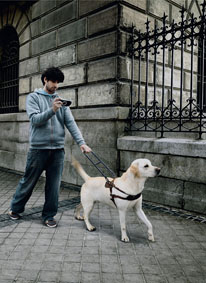Selling to the Disabled Can Mean More Than Ads
by Martin Krossel
Carmen Jones, the founder of the Solutions Marketing Group here, is a dynamo in a wheelchair. Her mission, which she pursues at conventions and businesses across the country, is to help companies develop and carry out marketing strategies aimed at people with disabilities.
But despite the growing awareness of an undertapped market that has led more than 100 major American corporations to include people with disabilities in advertising campaigns, Mrs. Jones emphasizes that reaching the disabled requires more than simply including them in ads.
"Companies need to tell consumers with disabilities that they are valued consumers," she said, "that they are not an inconvenience, that they will have ease in accessing services, and where there is staff it will be skilled in addressing their special needs."
To address such issues, another consulting firm founded by people with disabilities, W. C. Duke Associates, trains employees in service industries in the etiquette of dealing with customers with disabilities. Bill Duke, who founded the firm with his wife, Cheryl, and their son, Paul, has limited hearing; Paul has muscular dystrophy and has used a wheelchair since he was a teenager.
The Dukes' Opening Doors® training program encourages employees to acknowledge the disability of customers and never to be afraid to ask how they can assist them. But they are trained to follow instructions exactly, and never to insist on providing assistance that the customer does not request. Employees are also shown how to interact with individuals with specific disabilities. For instance, they are taught how to describe the arrangement of items on a table for a person who has limited sight.
The founders of both consulting companies say their goal is to benefit their business clients as much as serving the cause of people with disabilities. Mrs. Jones says she became convinced that her firm would be a success when she discovered that no ad agency had a department for devising market strategies aimed at consumers with disabilities.
"I didn't want to be in a position two or three years down the road," she said, "where an existing company went into a business in which I knew that I could have been successful."
Mrs. Jones and the Dukes say that having a disability themselves gives them additional credibility as consultants. People with disabilities, they say, are the "experts" because they know what it is like to encounter barriers.
Citing census data, Mrs. Jones and the Dukes and argue that people with disabilities constitute a huge market of some 56 million Americans. ...the Solutions Marketing Group and W. C. Duke both say they are having little trouble attracting business from Fortune 500 companies. Their clients seem willing to pay consultants to draw up marketing strategies that may yield, at least in the short run, only a small financial return.
Mrs. Duke acknowledges that her consulting services are often sought out by companies that are under the threat of lawsuit for not complying with the disability law. But that threat only acts as a catalyst for many of her clients, she says. Many, convinced that being more inclusive is "doing the right thing," eventually go far beyond the legal requirements in adapting their services for use by people with disabilities.
She says that the family business was driven at first more by a sense of mission than any confidence that they would eventually make money. The Dukes, former public-school teachers .... began with a Virginia travel guide for people with disabilities. Today, the business, started in 1988, generates enough revenue for the Dukes to be selective in acquiring clients. And their Opening Doors® program, Mrs. Duke said, has now established itself as a known brand among consumers with disabilities, who seek out companies that have put their staff through the training.


